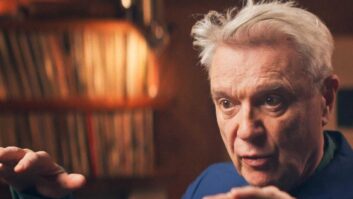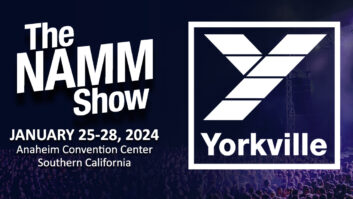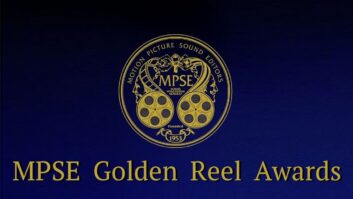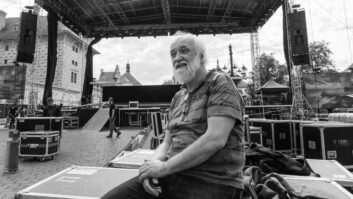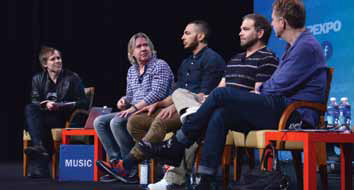
HOLLYWOOD, CA—The ninth-annual ASCAP “I Create Music” Expo, held in Hollywood in late April, provided an opportunity for numerous businesses to put themselves in front of an audience of songwriters, composers and producers that might not necessarily attend the pro audio industry’s more traditional trade conferences. Those represented included hardware manufacturers such as PMC and Prism Sound; hardware and software companies iZotope, Native Instruments and PreSonus; and retailers Sam Ash, demonstrating products from Electro-Voice, GoPro, Line 6, Yamaha and Steinberg, and Vintage King Audio, which co-sponsored the Producer and Composer Sessions room with PMC.
But in addition to hands-on and in-depth demonstrations of audio hardware and software, the expo also offered attending music-makers numerous opportunities to hear firsthand accounts of the business from established artists, composers and producers. One panel, “The Alchemists: How Hit Producers Turn Music into Gold,” highlighted the skill set required to help deliver success to top-level artists.
“It’s tough being a producer; we get paid a penny a download. But we’ve got to work like we’re getting paid five cents a download,” said Michael Knox, who has had a long association with country music artist Jason Aldean. “But what feeds us is that drive to have that hit song. We have to be A&R guys now; you’ve got to have that knowledge of the artist,” he said.
“If I know I’m going to work with a certain artist, the question is, what songwriter works best for this artist?” agreed Rob Knox (no relation), a longtime collaborator with Justin Timberlake.
Moderator Erik Philbrook, ASCAP’s assistant VP of marketing and communications, wondered how the panelists balance art and commerce. “Great commerce can only come from great art,” responded producer Steve Lillywhite. “I believe that if you make great art, commerce will come.”
Everybody breathed a sigh of relief when U2’s The Joshua Tree album was finished, said Lillywhite, who has worked extensively with the band. “I’m sure when Fleetwood Mac finished Rumours, they didn’t think, ‘yes, the money is coming in!’ They thought, ‘we’ve done something that we love.’”
Philbrook asked the producers how they stay ahead of the competition. “It’s about great songs,” said songwriter-producer Rick Nowels, who recently worked with Lana Del Rey. “The main role of the producer is to make sure you have the right material, whether you write with the artist or find it outside.”
“I don’t really look at it as competing with any other hit,” said Rob Knox. “Our approach is, what has [the artist] never done before?”
“Rocking the Screen: Artists Composing for Film & TV” assembled a panel of four artists-turned-scoring composers, including Alexander Ebert, front man of Edward Sharpe and the Magnetic Zeroes, who scored the Oscar-nominated All is Lost; Gabriel Mann of The Rescue, who composes for TV series Modern Family and Rectify; Jeff Russo of the band Tonic, who scores Fargo; and Adam Schlesigner of Fountains of Wayne, a prolific screen composer.
Ebert revealed that he is an aspiring filmmaker. “I also think cinematically when I write [music],” he said. “Technology makes our lives cinema; you’ve got your headphones on, your life is an epic.”
Mann noted the differences between the two visual media. “Television is a lot more of a regular job than movies,” he said, noting that someone working on a film might take a day to just to get the snare sounding right. “In that amount of time, I have written 45 minutes of score for three different [TV] shows.”
“The turnaround is so fast, in television at least, that you’re writing a piece of music and that’s it; you’re onto the next thing,” agreed Russo. “There’s not a lot of time to second-guess yourself. You’re being creative for the moment and then moving on.”
There are benefits to being in the worlds of both music recording and scoring, according to Schlesinger. “I think directors and creative people like the fact that they’re hiring somebody that’s not trying to do [scoring] as their primary focus. But a lot of times, people approached me because I was in a band that they liked.”
Ebert commented, “Most of what you get famous for, the music is merely secondary. The thing I like about scoring is that the music is really not about personality or fame. It’s about music serving a purpose.”



